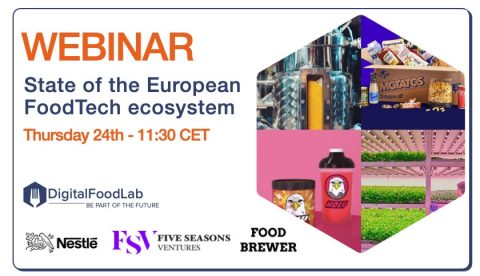Following the release of our report on the European FoodTech ecosystem, I am glad to invite you to a webinar we are organising on April 24th at 11:30 CET. You can register here.
The webinar will be divided in three parts:
1. First, I’ll share with you the main findings of the report (that you can download here), and DigitalFoodLab’s analysis for 2024 and where we are heading in terms of trends and funding.
2. Then, we’ll have a good slot of Q&A to answer your questions on key trends, investments, best opportunities to invest, M&A…
3. Finally, we’ll have an amazing discussion on the future of FoodTech, and how to finance it with some of the best players:
- Nestlé, the sponsor of the report (and the world’s largest food company)
- Ivan Farneti, co-founder and managing partner of Five Season Ventures, a leading European VC with a streak of successful exits
- Klaus Kienle, Co-founder of Food Brewer, a Swiss startup using cellular agriculture for cocoa and coffee, one of the hottest topics in the ecosystem.
One of the key topics we want to address in this webinar is “what’s next for FoodTech in Europe”. As shown in the report itself, if investments declined, it was much less visible that in other parts of the world. We identify three main factors:
- Public money helped national ecosystems emerge before and after COVID, and it also helped many startups avoid bankruptcy during and after COVID. Now, plans to boost the bioeconomy (with applications in agriculture and food such as bioinputs and proteins) will be critical for the next stage.
- External investors, which are now betting on European startups. While unfortunate in its success, the emergence of quick-commerce in Europe helped to put the old continent on the map.
- European-headquartered companies are now investing money and partnering with local players instead of looking first at US startups.
But, beyond we are somewhat worried on the prospects of a strong bounce back for European FoodTech due to these challenges:
- Regulation, while boosting some categories, is hindering innovation in alternative proteins.
- Internationalisation: beyond a few examples (mostly direct-to-consumer brands), for most startups, it is extremely hard to grow across borders.
- Lack of coherence between national initiation and EU-level plans: most countries support innovation, but they do it with different schemes, each requiring startups to submit lengthy applications.
- Lack of very large funds to scale industrial projects.
If you have any question that you would like us to cover during the webinar, suggestion on this topic, then them to us. In the meantime, if you want a quick intro the the European FoodTech ecosystem and something to share with your colleagues, here are some of the articles on our last report in Tech.eu, Alimarket (Spain), and Green Queen (HK).







